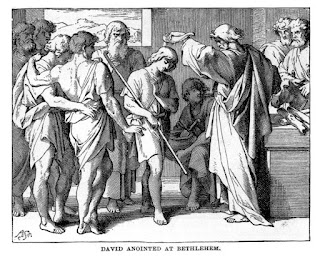 |
| Absalom - James Tissot |
TO CHEW ON: And Absalom answered Joab, "Look, I sent to you, saying, 'Come here, so that I may send you to the king, to say, "Why have I come from Geshur? It would be better for me to be there still." ' Now therefore, let me see the king's face; but if there is iniquity in me, let him execute me." 2 Samuel 14:32
The story of David and his sons is full of relationship game-playing.
It starts with David and two of his sons—half brothers Amnon and Absalom. When Amnon rapes Absalom's sister Tamar, David doesn't do anything about it even though there is a specific law against and punishment prescribed for incest (death) (2 Samuel 13:1-22; Leviticus 20:17). So Absalom takes revenge for the sin against his sister, kills Amnon, and flees to Geshur (2 Samuel 13:23-37). David us understandably heartbroken, and upset with Absalom.
Three years pass. When Joab, captain of David's army, sees that David is pining for Absalom, he devises a scheme whereby David's conversation with a wise woman gets him to recall Absalom to Jerusalem (2 Samuel 14:1-24).
That brings us to our today's reading where, after two years of David and Absalom living in the same town, David still hasn't called Absalom to see him or given him any indication that he's forgiven. When Absalom requests Joab come to him, Joab ignores him too. Absalom, in desperation, lights Joab's field on fire and that finally brings them face to face.
The result is a clear request for a meeting from Absalom to David (via Joab). When they meet, Absalom bows before his father, gets his dad's kiss (forgiveness) and things are good between them again… well, not quite.
For somehow, all this relationship drama has nurtured the thought in Absalom that he is more fit to be king than David is. And so we leave him conspiring to take over the throne.
I see in this story some relationship mistakes. They show us some things we can learn and apply as we interact within our families and communities:
1. David is lax in the way he handles Amnon's incest. This causes Absalom to distrust his father, who no longer appears to be acting righteously and justly.
David's failure here underlines the need for justice and integrity in us as parents and leaders—in front of our children and everyone who watches us.
2. Joab and David send mixed messages to Absalom. David calls him back to Jerusalem but then they never get together. Joab is instrumental in getting Absalom to return but then he ignores Absalom's request for an audience. Absalom is justifiably confused. Why has he been recalled? Has David forgiven him, or is he planning to kill him in revenge for Amnon's death?
We too need to give clear messages with our words and actions: " 'Let your yes be yes and your no, no' " Jesus says in Matthew 5:37.
3. Finally, Absalom lets his hurt and confusion fester into a plan to hurt his father back. If David is remiss in delaying his expression of forgiveness, Absalom is wrong in cultivating bitterness toward his dad.
When we've been wronged, we too need to forgive—completely and without secret plans to retaliate.
PRAYER: Dear God, please help me to live out these relationship qualities of justice transparency and forgiveness. Amen.
PSALM TO PRAY: Psalm 90
*********
Unless otherwise noted all Scripture quotations are taken from the New King James Version®. Copyright © 1982 by Thomas Nelson, Inc. Used by permission. All rights reserved.


















